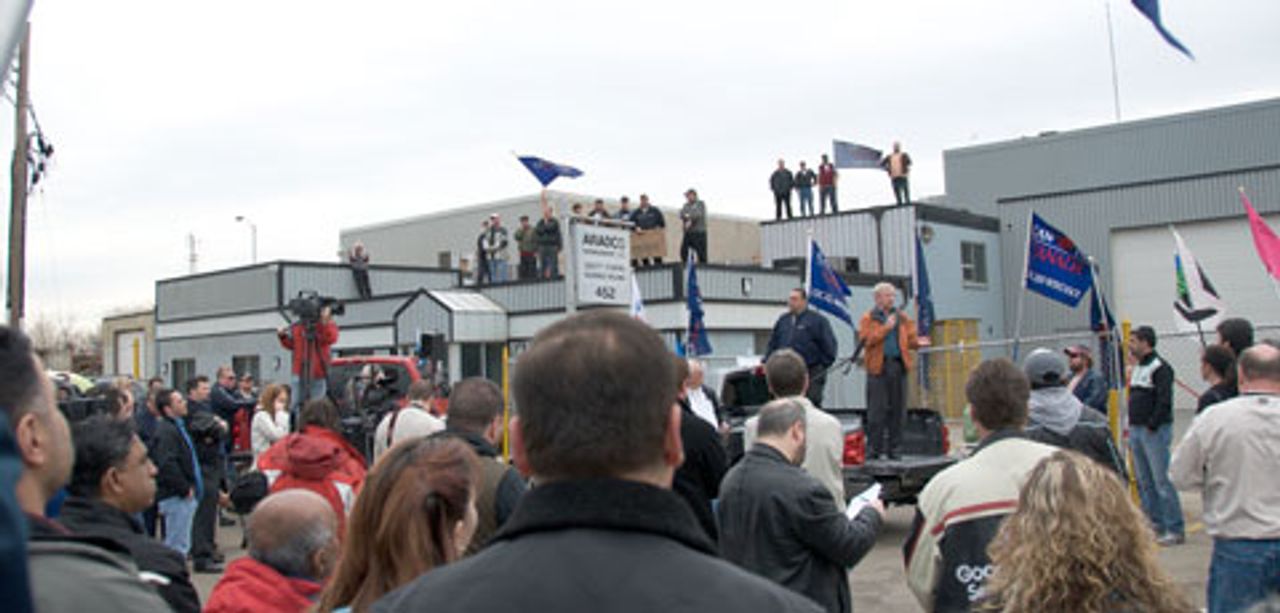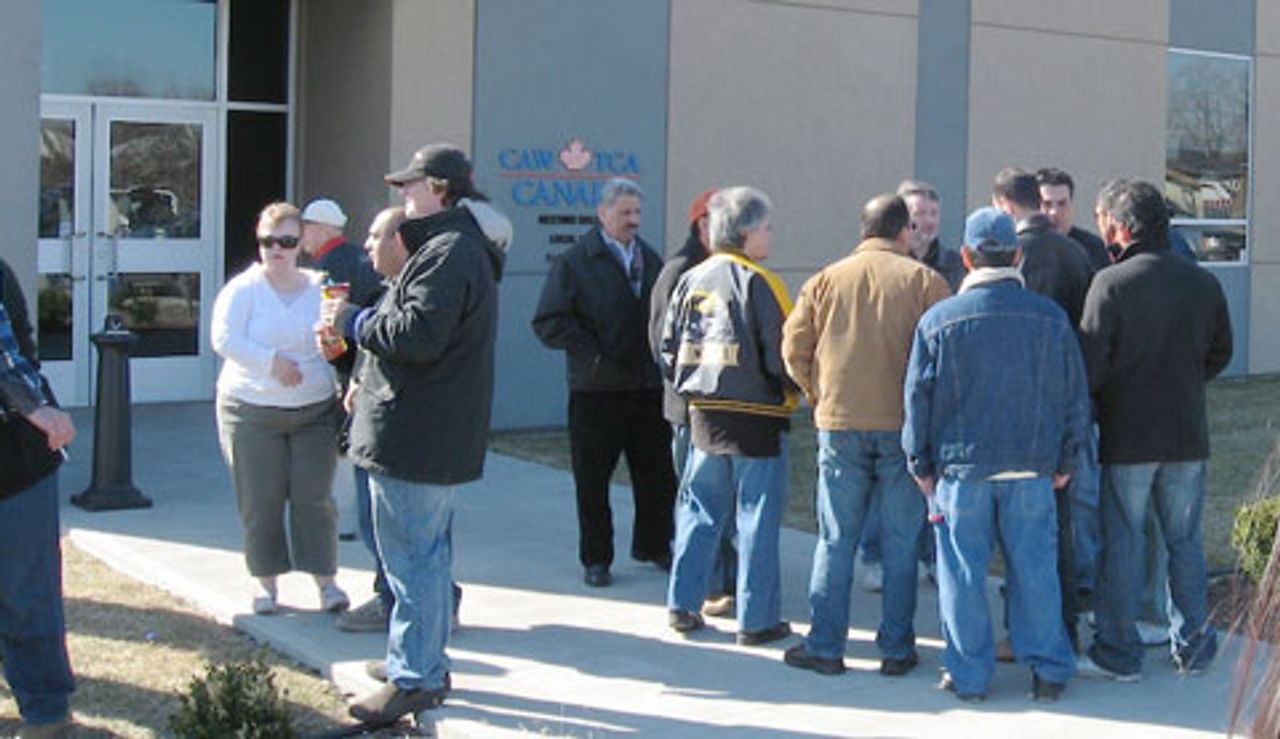Workers at two Windsor, Ontario, auto parts factories accepted a Canadian Auto Workers-brokered deal with Chrysler LLC, ending their factory occupation of Aradco and Aramco, Chrysler suppliers. Chrysler will pay the workers $400,000 (Canadian) which will be divided among the 90 workers—or about $5,000 a head.
 Occupying Aradco workers on the roof during Wenesday's rally
Occupying Aradco workers on the roof during Wenesday's rallyThe result was double the amount offered by Chrysler Monday, which the CAW told workers was the best they could get. The rank and file defied the CAW and rejected the deal Monday, preparing the ground for the occupation of the factory the next day. The outcome of the struggle, however, was bittersweet, leaving the workers without jobs and falling far short of their demands for $1.7 million in compensation.
The struggle demonstrated the powerful potential of workers to resist plant closings and layoffs, as well as the widespread support that such a struggle would generate. At the same time it made it clear that any fight must break free from the control of the CAW, which functions on behalf of the major corporations and the big business political parties.
Workers had occupied the plants in response to a closure announcement by parent company Catalina Precision Products, which stopped production last week after Chrysler pulled its contracts to the company, which stamps parts for the Detroit automaker's cars. Catalina refused to pay the workers their severance, vacation pay, and other benefits. When Chrysler won a court order assigning it control over parts and equipment within the plants, workers responded with picketing and ultimately the occupations.
Aradco and Aramco workers defied a court injunction demanding they clear the premises. Instead they gained access to the interior of the Aradco building, welded the doors shut behind them, and emerged on the roof.
The occupation culminated in a large rally on Wednesday, which drew broad working class support in Windsor, a depressed industrial city facing Detroit across Lake St. Clair and the Detroit River.
The occupation, initially carried out by about a dozen workers, soon drew hundreds, who protected the occupying workers inside from police arrest. About 500 workers, including from the nearby Chrysler minivan plant, joined the rally. Chrysler is threatening its entire Canadian workforce with layoff if workers do not accept a 25 percent cut in pay and benefits.
The CAW bureaucracy quickly moved to defuse the occupation and prevent a movement among Chrysler workers against plant closings and mass layoffs. CAW officials stressed that this was not a struggle against Chrysler and that it was not seeking to cripple the company by cutting off its supplies. The CAW, which recently imposed severe wage and benefit cuts on General Motors workers, is in intense discussion with Chrysler over the company's demands to more than double the hourly cost reductions the union gave to GM.
Moreover, the CAW desperately wanted to prevent a potential confrontation between workers and the Liberal and New Democratic Party politicians the union claims are "friends of labor." Chrysler reportedly obtained an injunction Wednesday empowering the police to break up the occupation and blockade—an action the CAW no doubt feared would trigger mass resistance from workers and a clash with city officials.
CAW head Ken Lewenza spoke on Wednesday before the rally. Demagogic rhetoric aside, Lewenza spoke from his knees, appealing to the corporate bosses and Canadian politicians. He warned that Chrysler's threats of uprooting from Canada jeopardized the "mood of cooperation" with the CAW. "We want to work with you, but don't crap on us," he pleaded.
Aradco workers had demanded the $1.7 million owed them by Catalina, as stipulated by Ontario law, but the CAW pressured them to accept the $400,000 offer from Chrysler. The union claimed it would sue Catalina to recover the remaining money.
On Monday workers rejected an offer from Chrysler of $205,000 by a 64 percent margin.
The occupation came not because of, but in spite of the CAW bureaucracy. Lewenza feared that the occupation could become a pole of attraction for imperiled autoworkers in Canada and beyond. The CAW, like the United Auto Workers in the US, is organically hostile to any independent working class action—especially one that challenges the prerogative of the capitalists to control "their property."
The CAW's threat to sue US-based Catalina, which claims it has been starved to near-bankruptcy by Chrysler, rings hollow. Catalina's "independence" from Chrysler is mythical; 99 percent of Catalina's business was with Chrysler.
The Aradco and Aramco occupations offer a glimpse of the potential strength of the autoworkers, and the broad working class solidarity they can draw behind them in struggle.
 Workers outside the CAW headquarters before the vote
Workers outside the CAW headquarters before the voteWorld Socialist Web Site reporters spoke with workers prior to the union meeting Thursday and distributed dozens of wsws.org statements on the crisis in the auto industry.
Workers exhibited no illusions about the settlement. "It's like bitterness and sweetness at the same time. It's all we can get," said Pepe. "We had no choice. We are in tears."
"We feel that we've been robbed," he explained." Some of us have worked here 16, 17, 18, up to 29 years."
"The union promises it will sue Catalina to get the rest of the money," Pepe continued. "I hope they're telling the truth."
"Here's my big problem with the bureaucrats. Even though we're losing our jobs and money, they're still making the same money, living the same lifestyle. Their lifestyle doesn't change."
"It's very hard here in Windsor. Our families are disintegrating due to the economic hardship. Husbands are going away to the West for a better life. Women are leaving their husbands behind looking for security. That happened to me.
"There's nothing over here in Windsor," Pepe concluded. "Just like Detroit. It's the same for both cities. They're tied together."
Jagdish, originally from India, agreed about conditions in Windsor. "It's very bad here," he said. "That's why we fought like this to get our money. Workers have to fight for their rights."
The WSWS asked Frank Kelly, an unemployed autoworker with previous experience at Aramco, what he would tell autoworkers the world over about the occupation. "This is just a crack in the ice," he said. "It will get wider and deeper."
WSWS reporters explained that autoworkers everywhere are facing the same assault on their wages and living conditions. Yet the response of the unions—the CAW, the UAW, and their European counterparts— is to drive down the wages and conditions of workers and to make "their" production more cost effective. This only serves to accelerate the impoverishment of autoworkers by pitting them in wretched labor competition.
It is now time to build an international movement of autoworkers as a spearhead for the mobilization of the working class globally. This must have as its central aims workers' control of industry and finance, and the reorganization of economic and political life on the basis of socialist planning to meet the needs of humanity as a whole rather than the profit drive of the banks and CEOs.
